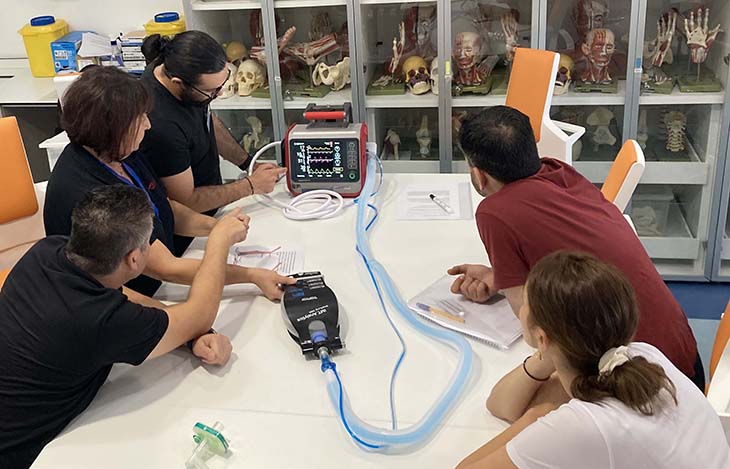The 1st Basic ICU Course
The first “BASIC ASSESSMENT AND SUPPORT IN INTENSIVE CARE (BASIC ICU COURSE)” seminar was successfully held on 21-22 June in the state-of-the-art simulation laboratories of the European University Cyprus School of Medicine. The seminar was organized by the Intensive Care Forum and gathered 35 participants, including doctors and nurses specialising in the care of critically ill patients.
During the two-day seminar, participants had the opportunity to learn essential critical care topics such as airway management, acute respiratory failure, mechanical ventilation, hemodynamic monitoring, shock management, severe sepsis, transport of critically ill patients, neurological emergencies, trauma, acute renal failure, cardiopulmonary resuscitation, arrhythmias, nutritional support of critically ill patients, analgesia and sedation, thromboprophylaxis, stress ulcers, and metabolic and electrolyte disturbances.
The seminar is held in more than 50 countries, such as Australia, the United Kingdom, the United States of America, Austria, Bahrain, China, Denmark, France, Germany, Iceland, Israel, etc. , and is held under the auspices of leading Critical Care associations, such as the European Society of Intensive Care Medicine, the Asia-Pacific Association of Critical Care Medicine, the College of Intensive Care Medicine of Australia & New Zealand, the Emirates Critical Care Society, the Indian Society of Critical Care Medicine, the International Pan-Arab Critical Care Society and the World Federation of Societies of Intensive and Critical Care Medicine.
Significantly, the seminar was hosted in the state-of-the-art laboratory facilities of the EUC School of Medicine. Participants had the opportunity to practice with human function simulators, ultrasound equipment, and models for puncturing large vessels under ultrasound guidance. The use of these advanced technologies ensured comprehensive and realistic training, enhancing the participants’ skills and their readiness to handle critical situations in clinical practice.
It is worth noting that the EUC School of Medicine recently acquired two new technologically innovative simulation models, which allow for the modeling of physiology in critically ill patients. This addition creates a more realistic behaviour of the models and highlights their reactions to various interventions. This innovative technology is used to meet the educational needs of postgraduate students at European University Cyprus who are specializing in Emergency and Intensive Care Nursing.
The commitment of European University Cyprus to adequately prepare its students for the challenges of their profession was further confirmed by the successful participation of three postgraduate students from the Emergency and Intensive Care Nursing program in the aforementioned seminar. European University Cyprus, the School of Medicine, and the Department of Health Sciences remain dedicated to enhancing healthcare, making a decisive contribution to the education of healthcare professionals and preparing them to face future challenges.

